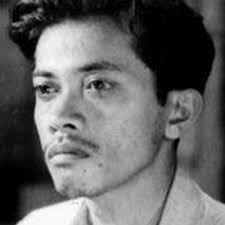Chairil Anwar
Anwar Chairil
[1922-1949] was born in Medan, East Sumatra, his family moved to Djakarta and
there isn't much information about his parents. He attended elementary school
and the first two years of a Dutch-language middle school in Mulo.
Though he began
writing quite early, in his adolescence, none of his early poetry has survived
as according to him he destroyed them.
In Djakarta he became the pioneering force among young writers and artist, the
"Generation of '45." He was also on the editorial of Siasat, an
important literary journal that appeared in 1947. He was also active in
political issues.
It was also through his writings that the Bahasa language which formally came
to exist in 1928 became an important literary language.
Chairil's poetry is marked by his emotional, and sometimes unconventional use
of language Although he had little formal education, he translated the poems of
Rilke, Marsman and Slauerhoff, and modelled his Indonesian poems on them. His
own approach to writing he once described: "In Art, vitality is the
chaotic initial state; beauty the cosmic final state."
Among Charil's most famous poems is Aku mau hidup seribu tahun lagi
(1943), Aku a cry for freedom and life. Another poem from this period is Dipo
Negro the title referring to an early nineteenth-century hero of the Indonesian
national struggle.
During his lifetime Charil published only in periodicals, but there are several
posthumous books, first of which were Deru tjampur Debu (1949), Kerikil Tadjam
and Jang Terampas dan Jang Putus (1951). Chairil wrote fewer than seventy
poems, some essays and radio addresses, and some fragmentary translations. He
died on April 28, 1949, in Djakarta. Due to his influence, the developing
Indonesian language attained equality with other languages as a literary
medium. Chairil's complete poetry and prose has been published in English in
The Voice of the Night (1992), translated by Burton Raffel.
Cintaku Jauh di Pulau
By Chairil Anwar
Cintaku jauh di pulau
Gadis manis, sekarang iseng sendiri
Perahu melancar, bulan memancar
di leher kukalungkan ole-ole buat si pacar
angin membantu, laut terang, tapi terasa
aku tidak ‘kan sampai padanya
Di air yang tenang, di angin mendayu
di perasaan penghabisan segala melaju
Ajal bertakhta, sambil berkata:
“Tujukan perahu ke pangkuanku saja.”
Amboi! Jalan sudah bertahun kutempuh!
Perahu yang bersama ‘kan merapuh
Mengapa Ajal memanggil dulu
Sebelum sempat berpeluk dengan cintaku?!
Manisku jauh di pulau,
kalau ‘ku mati, dia mati iseng sendiri.























